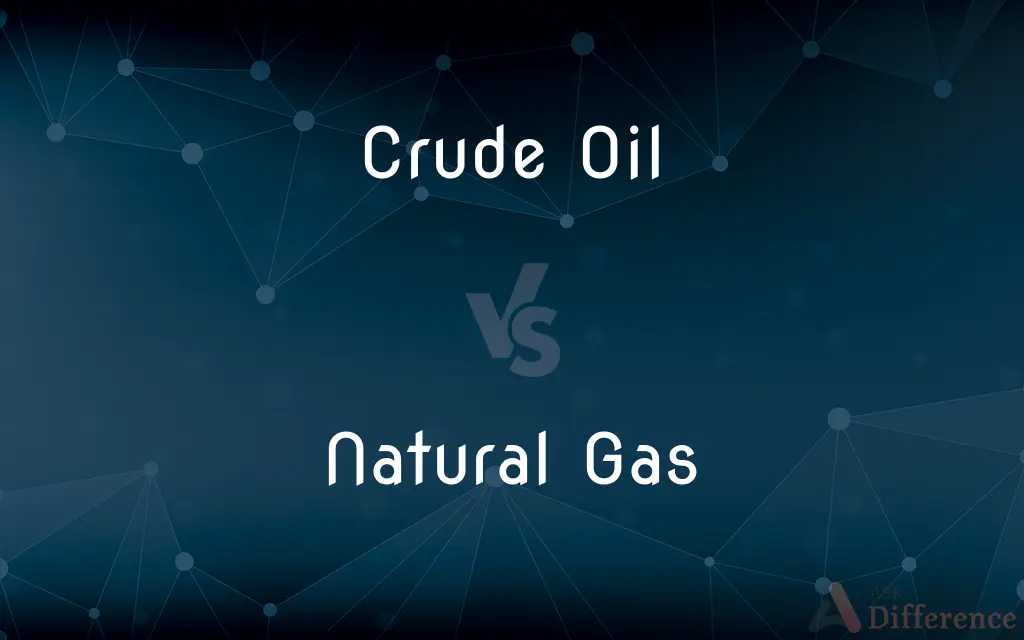Crude Oil vs. Natural Gas — What's the Difference?
By Tayyaba Rehman — Published on November 10, 2023
Crude Oil is a liquid hydrocarbon mix, while Natural Gas is primarily methane in gaseous form.

Difference Between Crude Oil and Natural Gas
Table of Contents
ADVERTISEMENT
Key Differences
Crude Oil is a naturally occurring, unrefined petroleum product composed of hydrocarbon deposits. It is extracted from underground reservoirs and is a primary source for gasoline after refining. Natural Gas, on the other hand, is a naturally occurring hydrocarbon gas mixture primarily consisting of methane, and it's used for heating, cooking, and electricity generation.
Crude Oil, when refined, yields products like gasoline, diesel, and lubricants. The refining process involves distillation where the oil is heated and separated into various components based on their boiling points. Natural Gas doesn't require this intricate refining process and can be processed to remove impurities before it's distributed.
Crude Oil has been a major global energy source for decades, fueling transportation and industries worldwide. The global economy has often been influenced by its price fluctuations. Natural Gas is seen as a cleaner alternative to coal for power generation because, when burned, it produces fewer greenhouse gas emissions.
Both Crude Oil and Natural Gas are finite resources, with reservoirs depleting over time. However, with advances in drilling technologies, especially in hydraulic fracturing and horizontal drilling, previously inaccessible reserves of both resources have become extractable.
It's vital to understand that while both Crude Oil and Natural Gas are hydrocarbons and are often found together in reservoirs, their uses, extraction methods, and impacts on the environment can differ significantly.
ADVERTISEMENT
Comparison Chart
State
Liquid at room temperature.
Gaseous at room temperature.
Main Constituent
Mix of hydrocarbons.
Primarily methane.
Usage
Refined into gasoline, diesel, etc.
Heating, cooking, electricity generation.
Extraction
Drilled and pumped from underground reservoirs.
Drilled and flowed up from underground reservoirs.
Environmental Impact
Releases more pollutants when burned.
Burns cleaner with fewer greenhouse gas emissions.
Compare with Definitions
Crude Oil
Crude Oil is an unrefined petroleum product.
The global economy can be affected by Crude Oil price changes.
Natural Gas
Natural Gas is extracted from underground reserves.
Advanced drilling technologies have increased Natural Gas production.
Crude Oil
Crude Oil contains a mixture of different hydrocarbons.
Refineries break down Crude Oil into various usable products.
Natural Gas
Natural Gas is considered a cleaner energy source.
Switching to Natural Gas can reduce carbon emissions.
Crude Oil
Crude Oil is a major source of transportation fuel.
Cars run efficiently due to gasoline derived from Crude Oil.
Natural Gas
Natural Gas can be liquefied for transport.
Liquefied Natural Gas (LNG) facilities enable global Natural Gas trade.
Crude Oil
Crude Oil undergoes refining to produce various products.
Distillation towers play a key role in separating Crude Oil components.
Natural Gas
Natural Gas is primarily composed of methane.
Many homes use Natural Gas for heating and cooking.
Crude Oil
Crude Oil is extracted from beneath the Earth's surface.
Drilling rigs access reserves of Crude Oil deep underground.
Natural Gas
Natural Gas is a hydrocarbon gas mixture.
The power plant generates electricity using Natural Gas.
Common Curiosities
Why is Natural Gas considered cleaner?
When burned, Natural Gas produces fewer greenhouse gas emissions compared to coal or Crude Oil.
What is Crude Oil?
Crude Oil is an unrefined petroleum product composed of hydrocarbon deposits.
What products come from Crude Oil?
Crude Oil is refined into products like gasoline, diesel, kerosene, and lubricants.
How is Natural Gas transported?
Natural Gas can be transported via pipelines or, when liquefied (LNG), by ships.
Is Natural Gas renewable?
No, Natural Gas is a finite resource, though it's more abundant than Crude Oil.
How is Natural Gas used in homes?
Natural Gas is commonly used for heating, cooking, and sometimes for water heating in homes.
Where is Crude Oil found?
Crude Oil is extracted from underground reservoirs, often found in regions like the Middle East, North America, and Russia.
How is Crude Oil extracted?
Crude Oil is drilled and pumped from underground reservoirs using oil rigs.
Can Crude Oil be used directly for fuel?
No, Crude Oil needs to be refined into products like gasoline and diesel for use as fuel.
What's the primary component of Natural Gas?
The primary component of Natural Gas is methane.
What is the environmental impact of Crude Oil?
When burned, Crude Oil releases pollutants and greenhouse gases, and spills can harm ecosystems.
Why are Crude Oil prices so volatile?
Crude Oil prices are influenced by supply, demand, geopolitical events, and other global factors.
Can Natural Gas be used in vehicles?
Yes, some vehicles run on Compressed Natural Gas (CNG) as a cleaner alternative to gasoline.
How does Natural Gas generation affect the environment?
Natural Gas burns cleaner than coal, producing fewer pollutants, but it still emits greenhouse gases.
Are Crude Oil and Natural Gas often found together?
Yes, many underground reservoirs contain both Crude Oil and Natural Gas.
Share Your Discovery

Previous Comparison
Internal Reconstruction vs. External Reconstruction
Next Comparison
Stem Tuber vs. Root TuberAuthor Spotlight
Written by
Tayyaba RehmanTayyaba Rehman is a distinguished writer, currently serving as a primary contributor to askdifference.com. As a researcher in semantics and etymology, Tayyaba's passion for the complexity of languages and their distinctions has found a perfect home on the platform. Tayyaba delves into the intricacies of language, distinguishing between commonly confused words and phrases, thereby providing clarity for readers worldwide.












































